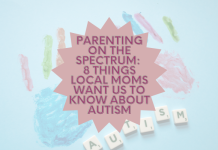Guest Post by Rhonda Thompson, Author of The Silent Screaming
I have been a nurse for almost three decades with the majority of that specializing in pediatrics.
My husband and I began raising my nephew when he was six years old with no knowledge of the extent of his issues. If you are raising a child with mental illness or know someone that is, I hope you find hope through our story found in The Silent Screaming: Raising a Child with Psychiatric Disorders & Mental Health Challenges.
I know the isolation and judgment families can feel in these situations. You are not alone and you do not have to be. There are resources you can identify that may be helpful in meeting the goal of helping you and your family live the best life under the circumstances.
Keep reading for local Arizona organizations that can help.
XO,
Rhonda Thompson
Being a parent is the hardest job you will ever have. Being a parent of a special needs child is even harder, mentally, and emotionally.
When my husband and I took custody of my nephew, we instantly became his parents and would strive to do all those things for him.
What we didn’t know is that we would soon become concerned about keeping him safe, protecting him from himself, and helping him navigate his own reality.
We became consumed with finding him help and found ourselves isolated from a world of “normal”. He looked like a normal, healthy little boy but inside his mind he was a tormented little soul.
If you are a parent of a child with psychiatric disorders, you understand. The world becomes very different for your child, for you and your family. It is not an easy world to navigate.
There are some signs that could indicate your child is having a difficult time.
Any change in their behavior could be indicative of something more than just “normal” child, teen, or young adult changes. These changes could be things like becoming more isolated, severe mood swings or a sudden change in their appearance.
Some of these things could be associated with social media influence or them trying to grow into their own identity. I wouldn’t want parents to jump to conclusions if their child begins to experiment, however, if the changes begin to disrupt their lives or the family dynamics and lasts longer than two weeks, talk to your pediatrician, therapist or even a school counselor.
Also, I can’t stress enough to talk to your child. Create a safe space for them to share how they are feeling and acknowledge their feelings. Be prepared to really listen to them and stay calm. They will be looking for your acceptance and most of all your love.
Given that every child and situation are different, the resources needed might be a bit different. In addition to speaking with your child’s pediatrician and/or a child/family psychologist about appropriate resources, you can also look for local resources through organizations like Raising Special Kids, Child Crisis Arizona, and Arizona’s Children Coalition.
I encourage you to be the voice for your child and don’t stop asking for the resources you need. If you would like to learn more about our story, you can find my book The Silent Screaming on Amazon or check out my website, www.thesilentscreaming.com for more information and resources.
I am also available to talk at [email protected].










